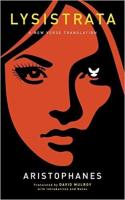
Wisconsin (2020) p/b 119pp £7.15 (ISBN9780299329846)
Wisconsin Studies in Classics are fast establishing themselves as the go-to translations for students of classics and drama, with three each of Sophocles and Aeschylus to date (see Anthony Verity’s review at https://classicsforall.org.uk/reading-room/book-reviews/aeschylus-agamemnon). But what kind of challenge is Lysistrata going to be? For many of us it was the first dirty literature we were actually encouraged to read and understand. Many a classics teacher has gone into the classroom knowing (s)he’ll get away with it (as your reviewer has) and emerge with a new kind of popular respect. After all, a sex strike to end a war! In fact it has been done to death (like many of its characters) and one suspects that the anticipation the new translator might feel about the chance to cut loose might soon pall. So the question becomes ‘What can I do that hasn’t been done?’ Well, here’s a radical suggestion—make it funny! Funny to read, funny to perform and funny to teach. That’s what M. has done.
Aristophanes, of course, has always been funny. But the translator has the task of making a 21st century audience laugh at material crafted for and relying on the individual and collective experiences of a highly critical 5th C BC audience. Mulroy has pulled this off, but how?
With a good introduction and notes, he has let Aristophanes speak. The translation is accurate, and, as we all know, the secret of great comedy is less what you say than how you say it. M. deploys metre perfectly for dramatic effect: iambic pentameter (inevitably) for day-to-day speech, changing to faster or slower modes according to the needs of the text, be it debate or dance. But how is the director, or teacher, to get over the problem of the type-cast women? As every Greek male knew, they were obsessed with sex and alcohol. But in the end, the joke’s on the men. They, the great strategists, the cunning tacticians, are completely out-manoeuvred by those who really ought to be sticking to their flibbertigibbetry. And that’s why we can also get away with the ‘Carry-On’ humour:
Lysistrata: Somebody, quick! Go get a jar and cup.
Myrtle: My goodness, ladies! What terrific jugs!
For decency’s sake I make no mention of the jokes about the physical impact of sex-deprivation on men. Just that the bakery local to the production this reviewer was once involved in enjoyed a spike in production of baguettes that week.
Of course, some jokes are so topical that any audience will need help. In the text, introduction and notes provide such. In the theatre the programme will have a serious job to do. But we can worry too much about that. General audiences still enjoy Coriolanus and Cymbeline. But the deceptive ease of Mulroy’s text is on the audience’s side. The director’s too. Compare these translations and decide which you would be most confident about saying on stage:
(Jack Lindsay): If they were trysting for a Bacchanal,
A feast of Pan or Colias or Genetyllis,
The tambourines would block the rowdy streets.
But now there’s not a woman to be seen
Except—ah yes—this neighbour of mine yonder.
(David Mulroy): If you’d announced a feast at Colias,
a shrine of Bacchus, Genetyllis, Pan,
you’d see a mob of women beating drums.
As is, there’s not a single one!
Except
My neighbour Kalonike!—Well! Hello!
The simple language also lends itself to lots of stage business. In this passage Lysistrata explains how to unravel the current conflict:
The city’s a fleece; so your first obligation
is washing the sheep shit away in a basin of water.
Then give it a beating. Get rid of the riffraff and the rabble. And what about citizens squeezing themselves into factions and running for office? Then call for a comb and a scissors. It’s off with their heads!
Consider the opportunities here for nudging and winking, ‘meaningful eye-contact’, breaking down the ‘fourth wall’ and addressing the audience direct (Frankie Howerd style). This is all the stuff of great comedy.
Finally, the funniest lines in the whole play. Lysistrata makes Kalonike swear an oath to reject sex whilst the war is on. She repeats her line for line:
Lysistrata: No crouching down on all fours like the lioness on my bronze cheese grater!
Kalonike: No crouching down on all fours like the lioness on Lysistrata’s bronze cheese grater!
‘Lysistrata’s’ in the second line is all Mulroy, not Aristophanes, and is sheer comic genius.
Adrian Spooner
